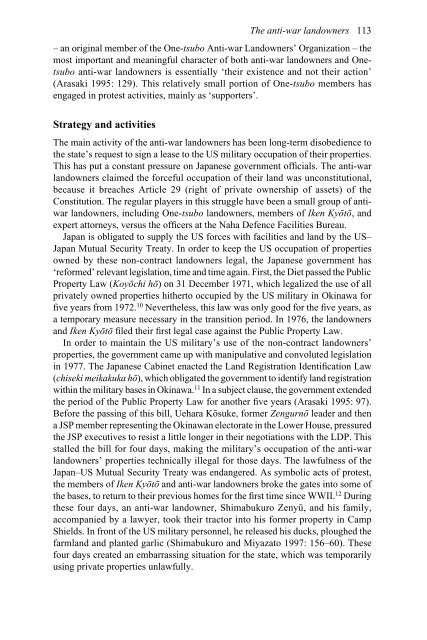Myth, Protest and Struggle in Okinawa
Myth, Protest and Struggle in Okinawa
Myth, Protest and Struggle in Okinawa
Create successful ePaper yourself
Turn your PDF publications into a flip-book with our unique Google optimized e-Paper software.
– an orig<strong>in</strong>al member of the One-tsubo Anti-war L<strong>and</strong>owners’ Organization – the<br />
most important <strong>and</strong> mean<strong>in</strong>gful character of both anti-war l<strong>and</strong>owners <strong>and</strong> Onetsubo<br />
anti-war l<strong>and</strong>owners is essentially ‘their existence <strong>and</strong> not their action’<br />
(Arasaki 1995: 129). This relatively small portion of One-tsubo members has<br />
engaged <strong>in</strong> protest activities, ma<strong>in</strong>ly as ‘supporters’.<br />
Strategy <strong>and</strong> activities<br />
The anti-war l<strong>and</strong>owners 113<br />
The ma<strong>in</strong> activity of the anti-war l<strong>and</strong>owners has been long-term disobedience to<br />
the state’s request to sign a lease to the US military occupation of their properties.<br />
This has put a constant pressure on Japanese government officials. The anti-war<br />
l<strong>and</strong>owners claimed the forceful occupation of their l<strong>and</strong> was unconstitutional,<br />
because it breaches Article 29 (right of private ownership of assets) of the<br />
Constitution. The regular players <strong>in</strong> this struggle have been a small group of antiwar<br />
l<strong>and</strong>owners, <strong>in</strong>clud<strong>in</strong>g One-tsubo l<strong>and</strong>owners, members of Iken Kyōtō, <strong>and</strong><br />
expert attorneys, versus the officers at the Naha Defence Facilities Bureau.<br />
Japan is obligated to supply the US forces with facilities <strong>and</strong> l<strong>and</strong> by the US–<br />
Japan Mutual Security Treaty. In order to keep the US occupation of properties<br />
owned by these non-contract l<strong>and</strong>owners legal, the Japanese government has<br />
‘reformed’ relevant legislation, time <strong>and</strong> time aga<strong>in</strong>. First, the Diet passed the Public<br />
Property Law (Koyōchi hō) on 31 December 1971, which legalized the use of all<br />
privately owned properties hitherto occupied by the US military <strong>in</strong> Ok<strong>in</strong>awa for<br />
five years from 1972. 10 Nevertheless, this law was only good for the five years, as<br />
a temporary measure necessary <strong>in</strong> the transition period. In 1976, the l<strong>and</strong>owners<br />
<strong>and</strong> Iken Kyōtō filed their first legal case aga<strong>in</strong>st the Public Property Law.<br />
In order to ma<strong>in</strong>ta<strong>in</strong> the US military’s use of the non-contract l<strong>and</strong>owners’<br />
properties, the government came up with manipulative <strong>and</strong> convoluted legislation<br />
<strong>in</strong> 1977. The Japanese Cab<strong>in</strong>et enacted the L<strong>and</strong> Registration Identification Law<br />
(chiseki meikakuka hō), which obligated the government to identify l<strong>and</strong> registration<br />
with<strong>in</strong> the military bases <strong>in</strong> Ok<strong>in</strong>awa. 11 In a subject clause, the government extended<br />
the period of the Public Property Law for another five years (Arasaki 1995: 97).<br />
Before the pass<strong>in</strong>g of this bill, Uehara Kōsuke, former Zengurnō leader <strong>and</strong> then<br />
a JSP member represent<strong>in</strong>g the Ok<strong>in</strong>awan electorate <strong>in</strong> the Lower House, pressured<br />
the JSP executives to resist a little longer <strong>in</strong> their negotiations with the LDP. This<br />
stalled the bill for four days, mak<strong>in</strong>g the military’s occupation of the anti-war<br />
l<strong>and</strong>owners’ properties technically illegal for those days. The lawfulness of the<br />
Japan–US Mutual Security Treaty was endangered. As symbolic acts of protest,<br />
the members of Iken Kyōtō <strong>and</strong> anti-war l<strong>and</strong>owners broke the gates <strong>in</strong>to some of<br />
the bases, to return to their previous homes for the first time s<strong>in</strong>ce WWII. 12 Dur<strong>in</strong>g<br />
these four days, an anti-war l<strong>and</strong>owner, Shimabukuro Zenyū, <strong>and</strong> his family,<br />
accompanied by a lawyer, took their tractor <strong>in</strong>to his former property <strong>in</strong> Camp<br />
Shields. In front of the US military personnel, he released his ducks, ploughed the<br />
farml<strong>and</strong> <strong>and</strong> planted garlic (Shimabukuro <strong>and</strong> Miyazato 1997: 156–60). These<br />
four days created an embarrass<strong>in</strong>g situation for the state, which was temporarily<br />
us<strong>in</strong>g private properties unlawfully.
















